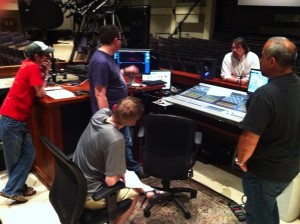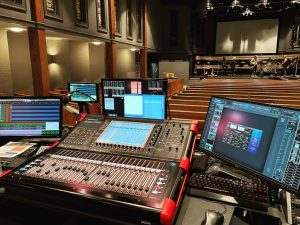Reader Mail: Formally Educating
One of the more frequent questions I get emailed about is formal education. Potential students want to know where to go and what to do. So I thought I’d finally try and tackle this since most potential students are coming up on the halfway point of their school year and may be trying to figure out what they’ll do next fall.
So where should you go to school?
I don’t know.
Seriously, I have no idea.
I’ve been out of college for over 15 years now, and I was a film major when I was there. I didn’t decide to truly focus on audio until about halfway through college, and even if I had known beforehand that audio was where I’d ultimately end up, there wasn’t much in terms of formal audio education that I knew of back then. There was no Google or Gearslutz or ProSoundWeb or YouTube. There weren’t even a lot of books to be found in the local library or bookstores. Telnet was the internet because there weren’t really any web browsers.
Most of what I’ve learned over time simply came from getting myself in a position where I could ask questions and apply what I learned. Then I would ask more questions and apply what I learned. I read a lot of magazine articles and books and still read a lot when I can. I also still ask a lot of questions and spend a lot of time experimenting and figuring things out.
So, in light of that, let me offer some advice for aspiring audio students.
If you go to school for audio, where you go probably won’t matter that much in the grand scheme of things. If I was looking for a formal audio education program today, I’d focus on the staff at schools and investigate the ones where the staff has real experience. In other words, you probably don’t want to learn from kids who’ve been out of school for 2-3 years that are now teaching Pro Tools. Those guys might be fine for a lab here and there and might be able to teach you a lot about a piece of gear, but ultimately you’re gonna need the guys who have been working in the trenches. Ideally, they’ll even have work you are familiar with and respect.
Now there might be an advantage in picking a specific school for networking opportunities, but that’s debatable. For example, my alma mater has a big alumni association in L.A. dedicated to the entertainment industry. If I had moved to L.A. after college looking for work in film or TV I probably would have used this for networking. There might be some informal regional stuff for audio, but I don’t know of anything specific. For example, if you want to work in Nashville, there might be an advantage to picking a school near Nashville and networking with alums. It’s not going to get you a gig, but in some situations when you’ve gone to the same school as your desired employer it can move you to the top of the pile.
Something you’ve got to keep in mind about higher education is you’re only talking about 2-4 years, which is nothing in light of a full career. Plus, if you go to a 4 year university, a chunk of that probably won’t even be your major. I’m not against school, but just keep a little perspective on it. School is the tip of the iceberg next to what you’ll learn from real experience.
I think the most important part of school is to approach it with the right attitude and milk it for everything you can. If you’re just entering into college, odds are you don’t know what you don’t know so you should be a sponge and take the initiative to learn and gain experience every chance you can. Then get out and into the real world and be prepared to start below the bottom rung.
In fact, if there’s anything you should really focus on learning it’s how to take initiative and how to learn and educate yourself. The reality is that the audio industry isn’t very big which means the jobs aren’t falling off trees. Nobody is going to hand you one just because you graduated with a degree or certificate.
The folks who excel at taking initiative are the ones who always seem to go the farthest. If you can take initiative and are willing to start below the bottom rung, you’ll have a lot more potential than the kid fresh out of the fancy-pants audio school who thinks he’s entitled to mix the biggest tours and records. Those guys rarely last in the gigs that matter.

 Next Post
Next Post






I agree it’s down to attitude. What I have seen is that you come into a working environment and say “I know audio” many people are skeptical because knowing about the gear and having a core competency in only mixing will tremendously limit the possible job opportunities. You MUST do more.
You have to know everything now. Audio guys now need to know video, networking, DSP programming, power, technical troubleshooting, scripting/coding… Mixing has just become one of many things we do as the 21st century audio guy. I’m not saying this to discourage anyone, I’m enouraging prospective readers to be different and stand out to employers.